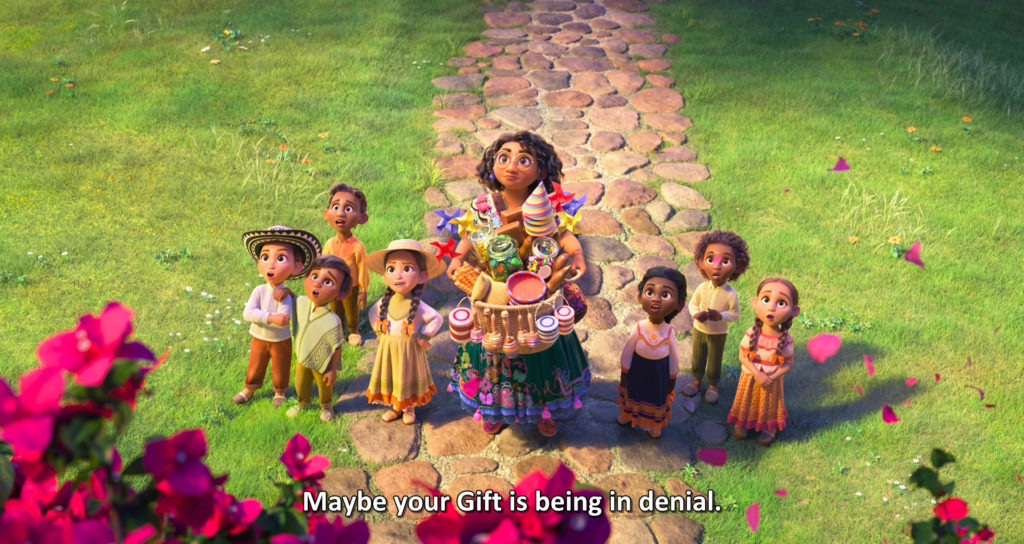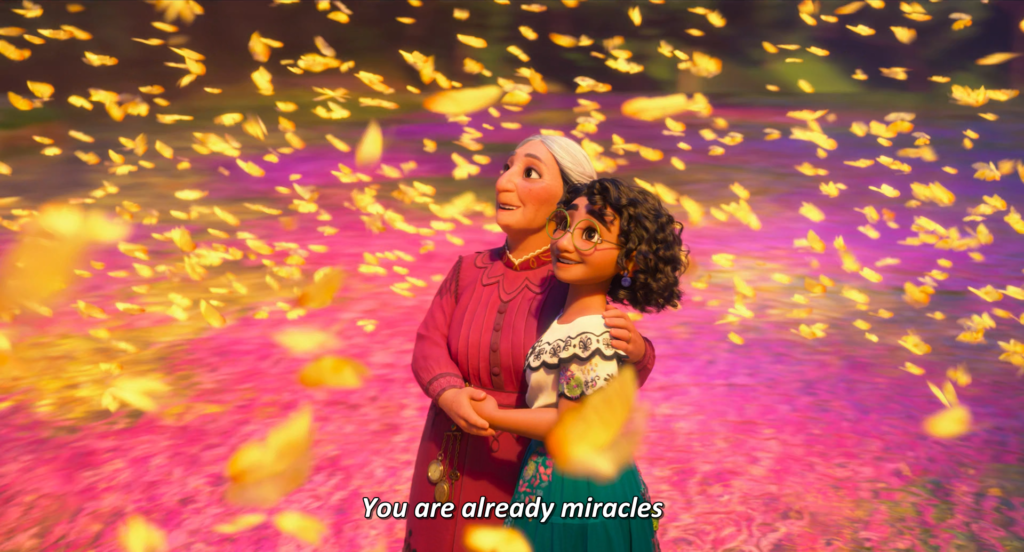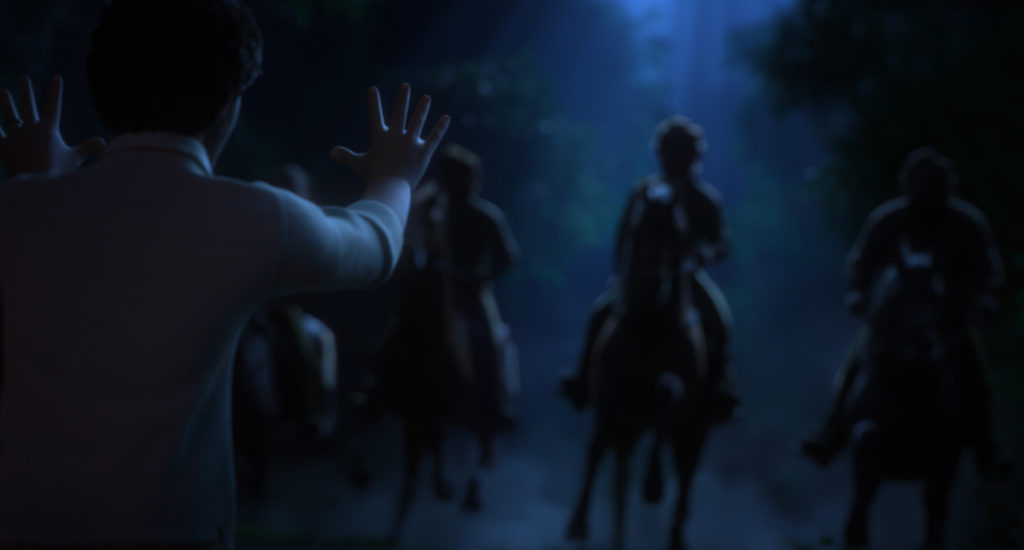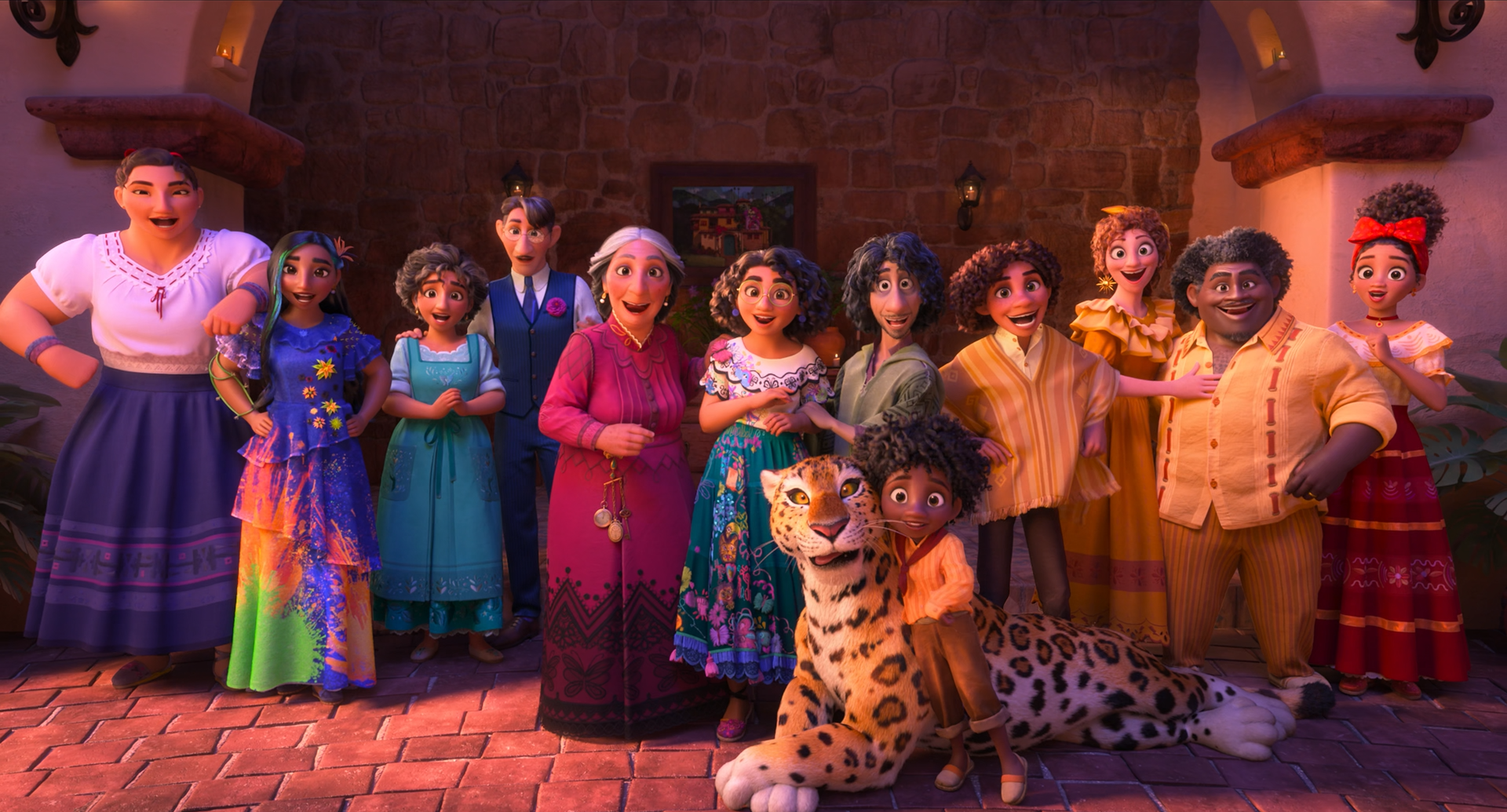Disney has been going through a rejuvenation process for quite some time now. We have seen representations of race not too far from mainstream in movies like Moana, Princess and the Frog, and Brave. Therefore, we might have already formed an idea about what a Colombian protagonist from Disney should be like. While the assumptions about the progressive representations are primarily valid, I could not but point out how relatable Disney’s Encanto was to me, an Asian viewer. I, therefore, feel Asian viewer should not look at the film as just another attempt to right Disney’s past wrongs but as something genuinely interesting for the community.
The story picks off with a Colombian family driven out of their homes by La Violencia, looking for a new place to stay. Many other families followed them and trusted them to be their leaders. The father, Pedro, dies trying to protect his people. The mother finds an everlasting candle that rewards her descendants with the gift of magic. She builds a big house (Casita) for her family and a village for her people with this gift. Every newcomer into the Madrigal family comes with a magical gift, apart from Mirabel (Stephanie Beatriz), our protagonist. Having no magical power like her sisters, she is often looked down upon. She constantly feels the need to prove herself. Her Abuela (Maria Cecilia Botero, singing voice Olga Merediz) treats her like a disappointment. One night, cracks show up on the walls of their magical home, and the family magic starts to fade. Despite not getting one herself, Mirabel puts on her investigative shoes to protect her family gifts.

Writers Byron, Smith, Jason, Kruse, and Miranda did not clarify why Mirabel is different from the other Madrigals. However, the message of the movie was straightforward. From the beginning of the movie, we constantly feel the people around Mirabel demeaning her for not living up to the family’s expectations. Mirabel tries not to think about it. We see her keep trying to please her Abuela (grandmother) but falter. The message is further clarified when we realize Luisa (Jessica Darrow), the eldest and the strongest cousin in the family, is secretly stressed out. She never shows how broken she is deep down. Her Sister Perfecto Isabela (Diane Guerrero) has given up her free will to keep the family happy. Her uncle Bruno left the family because he was tired of being a let-down.
Everyone is fighting their own battles. Even in this seemingly perfect family.
As a Disney movie, Encanto addresses mental health and stress for the very first time. Through Abuela, Encanto depicts a matriarch with unrealistic expectations. It shows what these expectations can do to a person mentally. The cracks on the walls of Casita represent the state of the family. Casita fumbles, and it is all because of Abuela.

The movie draws too many parallels with Asian and brown parenting. The Madrigals seem to be tight with their extended family, all of them living under the same roof. It also shows the standard excuse of the elders for being push-overs, that there is a higher reason to them being like this, a reason we will only find out when we are older. This excuse is seen when Abuela comes to the enchanted river to console Mirabel but also states that there was a reason why she acted that way. The typical Asian attitude that you need to be overachievers and that no achievement is good enough is also portrayed in Abuela‘s mindset. She treats Mirabel like a disappointment because she does not have a gift. For those that possess the gift, Abuela is never pleased with them because they need to be “better.” The writers also portray the need for parents to impart both their insecurities and ambitions onto their children through Abuela when she implies that her successors must keep the candle burning, regardless of what they want.
Encanto sticks true to most Disney clichés, like, a clear message, singing, dancing, cheerful weather, and a happy ending. Very PG. However, some similarities to previous movies are almost too hark. Since Beauty and the Beast, The Jungle Book, and Frozen are all owned by Disney, the inspirations in this movie perhaps cannot be called theft, but they are exact copies nonetheless. Disney’s attempts to make up for imparting problematic messages in the past are also evident in Encanto.
While previously Disney attempted to teach the viewers how to be perfect; in this movie, Disney tells us, “There’s no need to be perfect.”
The story has other clichés as well, like the famous Disney cliché, “Teamwork makes the dream work,” and the other Hollywood cliché of being able to see into the future but not seeing one particular aspect of it for plot development. However, this movie does break out of the cliché of always needing a villain.
The movie also gives a close to perfect representation of the Colombian culture, starting from the close family bonds to the highly complex cousin relations. Besides this, Disney makes the first attempt to break out of the stereotypes commonly held against Colombians. While the rest of Hollywood sees Colombia as a void for drug peddling, violence, and unrest, Encanto illustrates the fate of a family that got displaced because of the history of violence. Instead of portraying the story from the eyes of the media, Encanto shows us what it looks like from the eyes of the victim. In the scene where Pedro is murdered, La Violencia were faceless, an effort to dehumanize the terrorists instead of eternalizing them like in Narcos. Besides, the tendency of Colombians to try to build a home in the worst possible circumstances is also seen.

Before a conclusion, one particular character needs to be analyzed. Bruno Madrigal (John Leguizamo) is a widely misunderstood persona in the movie. He has the power to see the future but not to change it. He has visions of the future and warns the good villagers of their misfortunes. But people cannot handle the truth. When the future eventually comes true, they blame it upon Bruno. Unsurprisingly, Abuela hates Bruno. He cannot deal with the stress of living a life he did not choose for himself. He decides to leave to keep the family happy. The people act all he-who-must-not-be-named about him. We later find out, Bruno’s Colombian attachment towards family caught on, and he could not go too far. He cracked a hole behind a large photo frame and created a passage leading to the dining room. He kept seeing his family every day through the gaps in the wooden wall and pretended to be with them. Leguizamo does a decent job voicing Bruno, but I would have liked to see Lil Dicky take up the role.
A lot is going on in Disney’s Encanto. Luisa and Isabela’s psyches are broken down to validate the point of the story. Mirabel eventually unmasks the actual problem behind “the house falling apart,” which is Abuela’s unrealistic expectations. The expose was imperative upon Mirabel because she was the only member without magical powers. Her not having anything to prove in terms of abilities made her the only person with the mentality for the job. It all ties wonderfully together. The movie imparts a wholesome ambiance and can undoubtedly be placed on the same shelf as Disney’s best films.







